From static classicism to hellenistic dynamism V Hellenistic vigour-Hephaestion's funeral pile.
Foreign to Greece royal court introduced to the Hellenistic kingdoms art as the voice of monarchical power. However, none of the royal palaces, nor the tombs of rulers, survived. The exception are objects preserved by Roman culture - some works of Hellenistic art survived exported or copied in Rome. At the beginning of the new era, the accessibility of the art market for centers smaller than Athens increased (Makowiecka, 1987: 125).
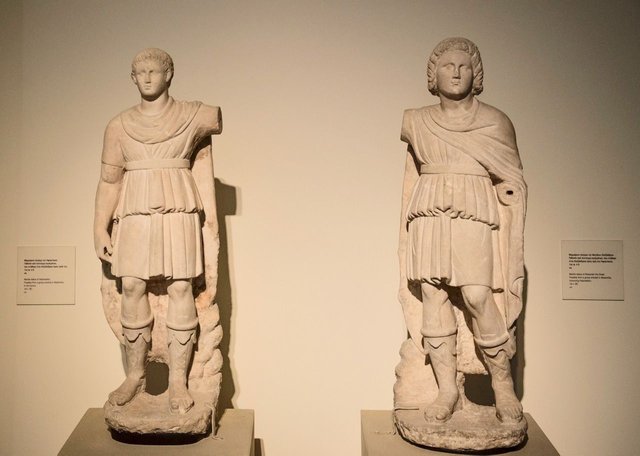_2017%202.jpg)
Marble statues of Hephaiston (left) and Alexander the Great (right). Possibly from a group erected to his honour in Alexandria. 1st. century BC.National Archaeological Museum in Athens, Author: Peulle, License:CC BY-SA 4.0
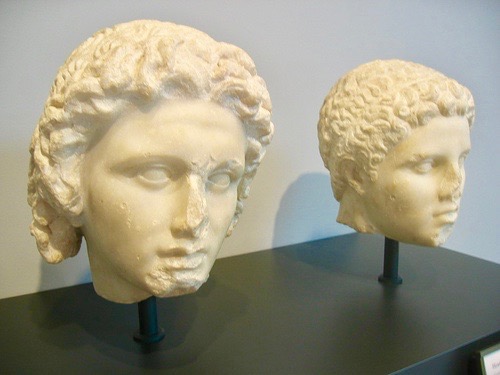
Busts of Alexander the Great and Hephaestion, Getty Villa Museum in Malibu, California. Author: Neilwiththedeal, License: Public domain
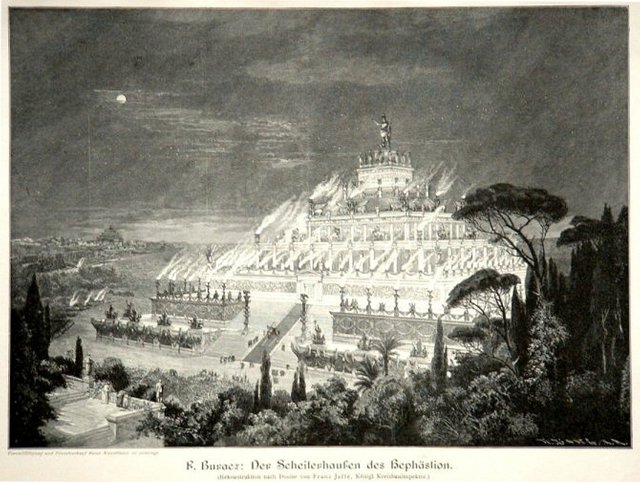
Der Scheiterhaufen des Hephäistion F. Buracz, Author: Andrew Chugg at alexanderstomb.com, License: copyrights expired-Public Domain
Alexander gathered artists and an army of workers and dismantled the city walls [Babylon] on a distance of 2 kilometres. He collected bricks and used them to level the terrain on which he was to find a pile [...] "- Diodorus Siculus, book XVII, 104-118.
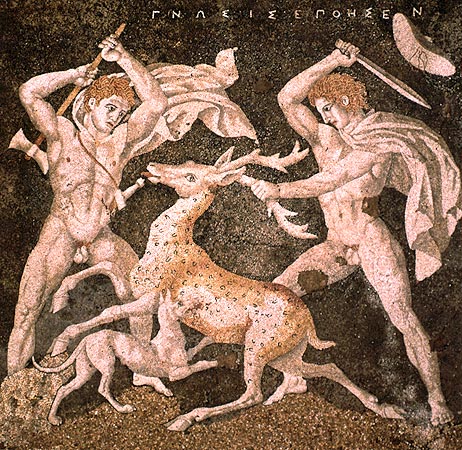
The Stag Hunt Mosaic, c. 300 BC, from Pella; right-Alexander the Great ,left-Hephaestion, Author: Vissarion, License: Public domain
The construction of the funeral pyre has provoked controversy among Alexander’s contemporaries with its scale and price. The ubiquitous palm wood (Diod.) was used in the construction. The iconography approved by Alexander reflected the deeds of Hephaestion over a dozen or so years. The content of the reliefs was a mixture of religious and political symbolism of Oriental and Macedonian origin. Some motifs are known from Attic tombstones from the 4th century.
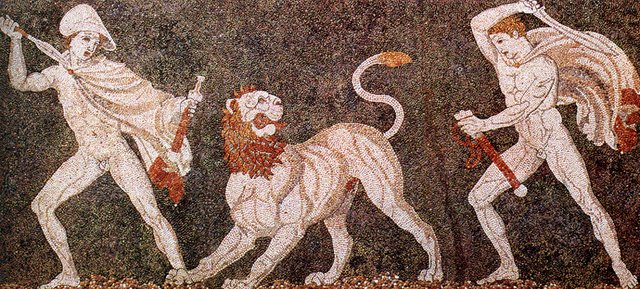
Lion hunt. Mosaic from Pella, Macedonia, late 4th century BC, depicting Alexander the Great and Craterus. Pella Museum, Author: Jvdc, License: Public domain
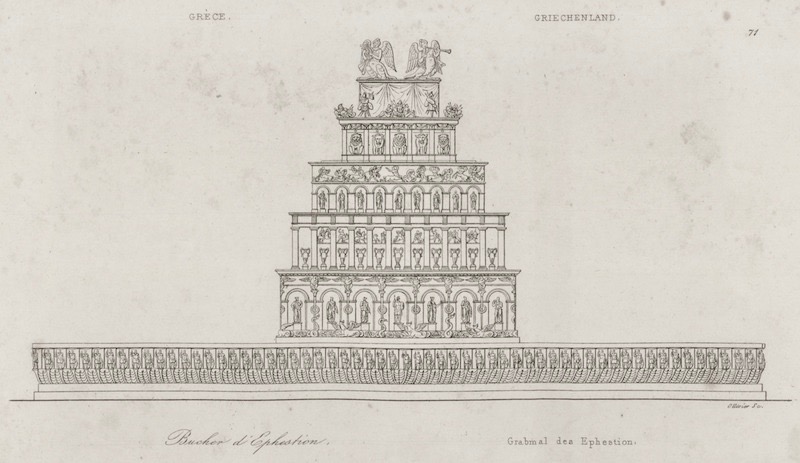
François Charles Hugues Laurent Pouqueville. Grèce. Paris, Firmin Didot, 1835, Author: Gts-tg, License: Public domain
The fifth level, also gilded, was decorated with alternating images of lions and bulls - symbols of the gods of Babylonia: Ishtar and the guards of the pile, respectively.
Aelian (Claudius Aelianus, Varia Historia) writes that golden objects were thrown into the fire, while Diodor completes that Hephaestion's companions ordered gold and bone items before the ceremony in order to please Alexander.
In addition, concave forms of sirens were built around the pile and at its top, in which real singers wailed. They sang until the pile was burned.
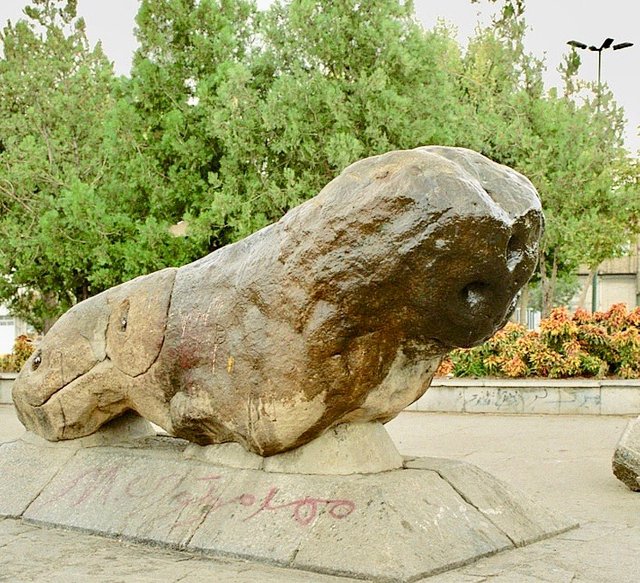
The Sang-e shir, stone lion (Hamadan, Iran) is a greek statue from the 4th century BC, a gift of Alexander the Great in the memory of Hephaestion, Author: Simorg, License: CC BY-SA 3.0
References
Images: sources linked below
Photo: @highonthehog
Palagia, O.,Hephaestion’s Pyre and the Royal Hunt of Alexander, Oxford University Press, Oxford, 2000
Makowiecka, E., Sztuka grecka – krótki zarys, Wydawnictwo Uniwersytetu Warszawskiego, Warszawa, 1987
Michałowski, K. (red.) Encyklopedia sztuki starożytnej, Wydawnictwa Artystyczne i Filmowej, Warszawa, 1974
The Library of History of Diodorus Siculus of the Loeb Classical Library edition, 1963
http://penelope.uchicago.edu/Thayer/E/Roman/Texts/Diodorus_Siculus/17F*.htmlClaudius Aelianius, Varia Historia, Book XII, chapter 7
An English Translation of Claudius Aelianus' Varia Historia, Studies in Classics;V. 2, 1997

DISCLAIMER: dropahead Curation Team does not necessarily share opinions expressed in this article, but find author's effort and/or contribution deserves better reward and visibility.
to maximize your curation rewards!
with SteemConnect
12.5SP, 25SP, 50SP, 100SP, 250SP, 500SP, 1000SP
Do the above and we'll have more STEEM POWER to give YOU bigger rewards next time!
News from dropahead: How to give back to the dropahead Project in 15 seconds or less
👍 a-0-0
Wow! Where do you find all these interesting nuggets of information :)
So the plan was to write just one post about the life of Alexander the Great.. and here we are :)
Of course, I had to refresh my knowledge and read few books, ended up with a ton of notes, which I thought will serve well for the next few posts ;) Thanks for having patience to read it ;)
Wonderful post!
thank you :)